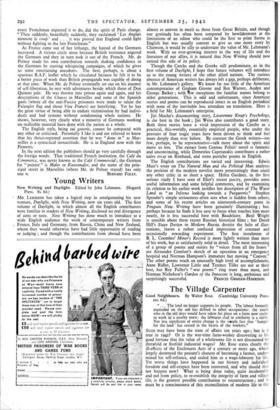Young Writers
• MR. LEHMANN has taken a logical step in amalgamating his new venture, Daylight, with New Writing, now six years old. The first volume of Daylight, in which almost all the English contributors were familiar to readers of New Writing, disclosed no real divergence of aims or taste. New Writing has done much to introduce to a wide English audience the work of contemporary writers from • France, Italy and Germany, from Russia, China and New Zealand, whom they would otherwise have had little opportunity of reading or judging ; and though the contributions from abroad have, been almost as uneven in merit as those from Great Britain, and though our gratitude has often been tempered by bewilderment at the limitations of an editor who could be the first to print Sartre in English but was usually content to give us one more story by Chamson, it would be silly to understate the value of Mr. Lehmann's work. With an ever-growing interest in the way of life and the literature of our allies, it is natural that New Writing should now extend this side of its policy.
Though the Czechs and the Greeks still predominate, as in the first volume of Daylight, I hope that future volumes will introduce us to the young writers of the other allied nations. The curious absence of American writers has always left a gap, perhaps deliberate, in Mr. Lehmann's gallery. We know far too little of the American contemporaries of Graham Greene and Rex Warner, Auden and George Barker ; with iltw exceptions the familiar names belong to older generations. This is odd and unfortunate, since American stories and poems can be reproduced intact in an English periodical with none of the inevitable loss attendant on translation. Here is a field for Mr. Lehmann's enterprise.
Jiri Mucha's disconcerting story, Lieutenant Knap's Psychology, is the best in the book ; Jiri Weiss also contributes a good story. Both these stories leave a vivid impression of the Czechs as a practical, this-worldly, essentially empirical people, who under the pressure of four tragic years have been driven to think and feel more deeply than ever before. By contrast the Greek writers—too few, perhaps, to be representative—talk more about the spirit and move us less. The extract from Cosmas Politis' novel is fantastic and unconvincing, while Demetrios Capetanakis contributes a rather naive essay on Rimbaud, and some pastiche poems in English.
The English contributions are varied and interesting. Edwin Muir's essay on The Natural Man and the Political Man analyses the position of the modern novelist more penetratingly than could any other critic in so short a space. Helen Gardner, in the first serious study I have seen of Eliot's recent poetry, provides some useful information and some helpful comments, and by examining its relation to his earlier work justifies her description of The Waste Land as " an Inferno looking towards a Purgatorio." Stephen Spender's simple seriousness often sees what is hidden from others, and some of his recent articles on nineteenth-century poets in Penguin New. Writing have been genuinely illuminating ; but, perhaps because he finds it less easy to focus what touches him more nearly, he is less successful here with Baudelaire. Basil Wright is sensible about three recent Russian historical films ; but Derek Hill's Stare Design in Modern Russia, despite the help of illus- trations, leaves a rather confused impression of constant and occasionally rewarding experiment. The first instalment of B. L. Coombes' Miner's Record is more lightly written than most of his work, but as satisfactorily solid in detail. The most interesting of a group of poems and stories by " voices from all the fronts " are Alexander Comfort's sketch of an operation in an emergency hospital and Norman Hampson's immature but moving " Convoy." The other poems reach an unusually high level of accomplishment, Anne Ridler, Lawrence Little and Terence Tiller are not at 'their best, but Roy Fuller's " war poems " ring truer than most, and Norman Nicholson's Garden of the Innocent is long, ambitious and


























 Previous page
Previous page